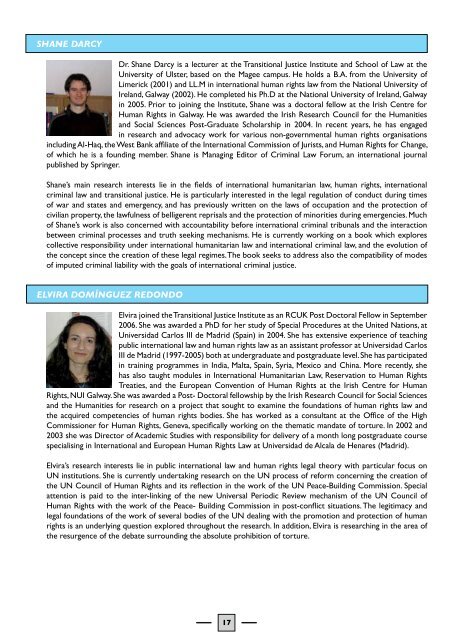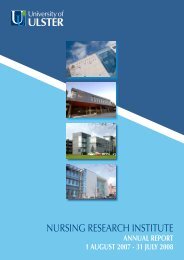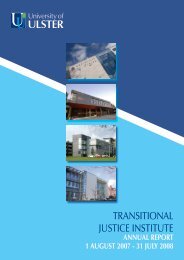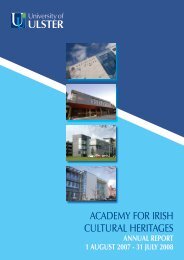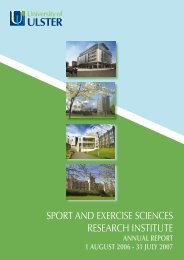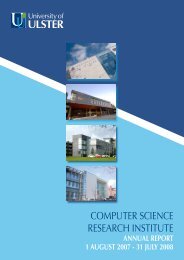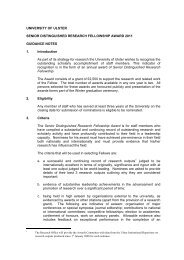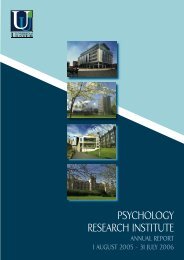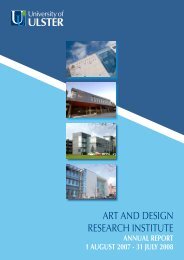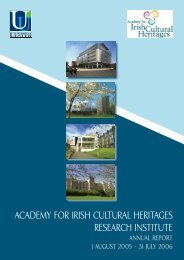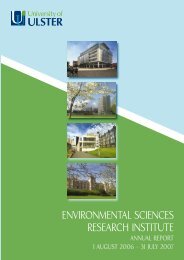transitional justice research institute - University of Ulster
transitional justice research institute - University of Ulster
transitional justice research institute - University of Ulster
You also want an ePaper? Increase the reach of your titles
YUMPU automatically turns print PDFs into web optimized ePapers that Google loves.
Shane Darcy<br />
Dr. Shane Darcy is a lecturer at the Transitional Justice Institute and School <strong>of</strong> Law at the<br />
<strong>University</strong> <strong>of</strong> <strong>Ulster</strong>, based on the Magee campus. He holds a B.A. from the <strong>University</strong> <strong>of</strong><br />
Limerick (2001) and LL.M in international human rights law from the National <strong>University</strong> <strong>of</strong><br />
Ireland, Galway (2002). He completed his Ph.D at the National <strong>University</strong> <strong>of</strong> Ireland, Galway<br />
in 2005. Prior to joining the Institute, Shane was a doctoral fellow at the Irish Centre for<br />
Human Rights in Galway. He was awarded the Irish Research Council for the Humanities<br />
and Social Sciences Post-Graduate Scholarship in 2004. In recent years, he has engaged<br />
in <strong>research</strong> and advocacy work for various non-governmental human rights organisations<br />
including Al-Haq, the West Bank affiliate <strong>of</strong> the International Commission <strong>of</strong> Jurists, and Human Rights for Change,<br />
<strong>of</strong> which he is a founding member. Shane is Managing Editor <strong>of</strong> Criminal Law Forum, an international journal<br />
published by Springer.<br />
Shane’s main <strong>research</strong> interests lie in the fields <strong>of</strong> international humanitarian law, human rights, international<br />
criminal law and <strong>transitional</strong> <strong>justice</strong>. He is particularly interested in the legal regulation <strong>of</strong> conduct during times<br />
<strong>of</strong> war and states and emergency, and has previously written on the laws <strong>of</strong> occupation and the protection <strong>of</strong><br />
civilian property, the lawfulness <strong>of</strong> belligerent reprisals and the protection <strong>of</strong> minorities during emergencies. Much<br />
<strong>of</strong> Shane’s work is also concerned with accountability before international criminal tribunals and the interaction<br />
between criminal processes and truth seeking mechanisms. He is currently working on a book which explores<br />
collective responsibility under international humanitarian law and international criminal law, and the evolution <strong>of</strong><br />
the concept since the creation <strong>of</strong> these legal regimes. The book seeks to address also the compatibility <strong>of</strong> modes<br />
<strong>of</strong> imputed criminal liability with the goals <strong>of</strong> international criminal <strong>justice</strong>.<br />
Elvira Domínguez Redondo<br />
Elvira joined the Transitional Justice Institute as an RCUK Post Doctoral Fellow in September<br />
2006. She was awarded a PhD for her study <strong>of</strong> Special Procedures at the United Nations, at<br />
Universidad Carlos III de Madrid (Spain) in 2004. She has extensive experience <strong>of</strong> teaching<br />
public international law and human rights law as an assistant pr<strong>of</strong>essor at Universidad Carlos<br />
III de Madrid (1997-2005) both at undergraduate and postgraduate level. She has participated<br />
in training programmes in India, Malta, Spain, Syria, Mexico and China. More recently, she<br />
has also taught modules in International Humanitarian Law, Reservation to Human Rights<br />
Treaties, and the European Convention <strong>of</strong> Human Rights at the Irish Centre for Human<br />
Rights, NUI Galway. She was awarded a Post- Doctoral fellowship by the Irish Research Council for Social Sciences<br />
and the Humanities for <strong>research</strong> on a project that sought to examine the foundations <strong>of</strong> human rights law and<br />
the acquired competencies <strong>of</strong> human rights bodies. She has worked as a consultant at the Office <strong>of</strong> the High<br />
Commissioner for Human Rights, Geneva, specifically working on the thematic mandate <strong>of</strong> torture. In 2002 and<br />
2003 she was Director <strong>of</strong> Academic Studies with responsibility for delivery <strong>of</strong> a month long postgraduate course<br />
specialising in International and European Human Rights Law at Universidad de Alcala de Henares (Madrid).<br />
Elvira’s <strong>research</strong> interests lie in public international law and human rights legal theory with particular focus on<br />
UN institutions. She is currently undertaking <strong>research</strong> on the UN process <strong>of</strong> reform concerning the creation <strong>of</strong><br />
the UN Council <strong>of</strong> Human Rights and its reflection in the work <strong>of</strong> the UN Peace-Building Commission. Special<br />
attention is paid to the inter-linking <strong>of</strong> the new Universal Periodic Review mechanism <strong>of</strong> the UN Council <strong>of</strong><br />
Human Rights with the work <strong>of</strong> the Peace- Building Commission in post-conflict situations. The legitimacy and<br />
legal foundations <strong>of</strong> the work <strong>of</strong> several bodies <strong>of</strong> the UN dealing with the promotion and protection <strong>of</strong> human<br />
rights is an underlying question explored throughout the <strong>research</strong>. In addition, Elvira is <strong>research</strong>ing in the area <strong>of</strong><br />
the resurgence <strong>of</strong> the debate surrounding the absolute prohibition <strong>of</strong> torture.<br />
17


